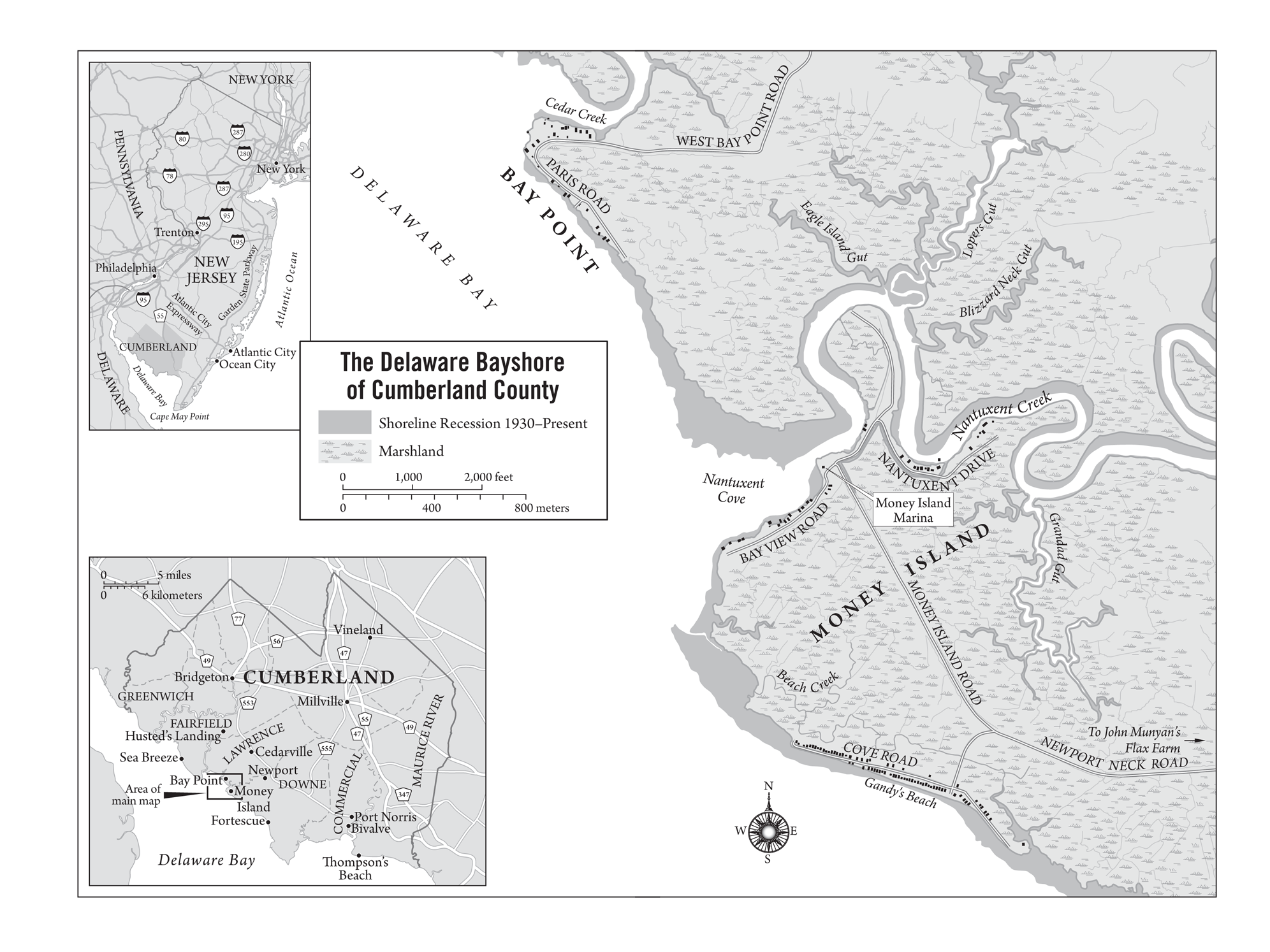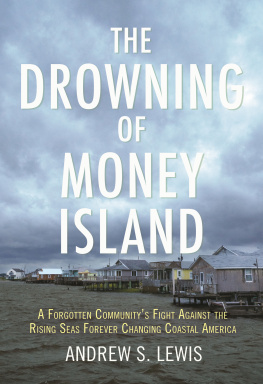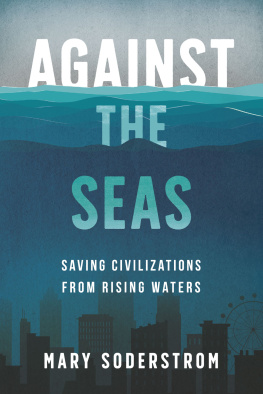Contents
Guide


To my parents, for letting me fly

PROLOGUE
DEMO DAY
NOVEMBER 21, 2017
The foxhounds wails rolled like a wave across the marshland. They joined the roar of the Komatsu excavator, owned by Site Enterprises, the company contracted by the state for $1.2 million to demolish all but three of the remaining twenty-three homes in Bay Point. The engine revved, and the excavators thirty-five-foot boom stretched out and in as its huge, rusted claw opened and closed. Its metal treads rattled as they rolled over the unpaved roads potholes. At the little bridge that led over Cedar Ditch and into Bay Point, the machine swiveled around slowly, then stopped to face the one-story home once owned by an old man named Bones Batten. The grasses that had grown up around Boness place shifted in the wind, a blush of summer green still visible in their stalks.
In recent years Boness driveway had become more muck than dirt. Back when Bay Point consisted of more residents than just Mike and Kate Nelson, Bones had served as the Bay Point Rod & Gun Clubs custodian. His was the first house you passed driving into the hamlet. It was a typical South Jersey Bayshore homeboxy, weather-beaten, its front yard cluttered with a small fishing boat, trailer, outboard motor, crab pots, and coolers. Around here, it was less about what you did with your home and more about what you did with the land surrounding it. Just outside Boness house was the place where the club had installed its first security camera, which had long since been turned off.
The excavator stopped, turned, and contemplated the back corner of the house, where a small porch was half slumped into a stand of foxtails. The boom reached out, sunk its claw into the structure as if it were nothing but paper. Wood framing split. Drywall crunched. Window glass exploded. Shreds of pink insulation floated like feathers in the breeze. And then a different sound rose, impossibly, above all the othersa sound that I recognized well. It was Parker, Mike and Kates five-year-old Chesapeake Bay retriever, desperately barking from inside their nearby bungalow. Parker only barked like that when he was alone and frightened. Mike and Kate had left for the daythey werent interested in watching Bay Point get torn to the ground.
All afternoon, I had been standing beside Cedar Creek, where Bay Point Marina once stood, watching the excavator transform Boness house into a neat, unremarkable pile of building material. I tried to imagine what the creek had looked like with the marinas many docks floating on its surface. All the noise of one of Mike and Kates famous summer fishing tournaments. The laughter, the cracking of beers, the whine of boats heading out to, and coming in from, the bay. The smell of grilled fish and hamburgers and hot dogs, sunblock. The odor of the marshland, sulfurous but somehow also sweet. Id seen some of the pictures by nowthe glossy red faces of Mike and Kate twenty years younger; their two children, Katie and Mikie, hoisting up fish nearly as big as themselves. Forever-unknown fishermen who showed up from out of town for the tournament and stayed for the party.
The foxhounds must have moved onor theyd gone quiet, having finished their job. I had been hiding long enough, so I started walking toward the demolition. I stopped on the little bridge spanning Cedar Ditch. The bent and twisted metal sign at its entrance read Anthony Zadlo Memorial Bridge: 1995. A young man held a hose that cast a limp stream of water, pumped from the ditch, onto the debris that was once Boness house. He offered a friendly wave and then went back to watering the pile. The other workers looked at me with puzzlement, wondering why anyone cared to come all the way out here to watch an old house get torn down.
While it was true that I had come far to get here, it was also true that I had come home. I had grown up eight miles to the northwest, across a stretch of nearly unbroken marshland, but Id only recently returned to South New Jersey after being gone for fifteen years. I needed to see this piece of my past before it was erased and returned to nature. In the years I had been gone, the Delaware Bay had been rising ever faster, consuming the worn, tired communities that dotted the Bayshore, as it is called. The wild vastness of the open spaces that surrounded me was woven into my DNAno amount of distance could untangle me from it. I had never expected that, one day, there would have to be a choice like the one made in Bay Pointone that pitted the Bayshores people against nature rather than in harmony with it, as I and my ancestors had always understood the relationship.
After standing on the bridge for a while, a man approached me. He was tall, and a pair of wire-rimmed glasses were perched low on his long nose. He wore a red hardhat and an orange reflective vest. His khaki carpenter pants were clean.
Are you with the state? I asked.
Blue Acres, the man yelled over the roar of the excavator, which was just a few feet away. He introduced himself as Gary Parent. He was the on-site representative for the Blue Acres Superstorm Sandy Program, an open-space acquisition initiative under the DEP, New Jerseys Department of Environmental Protection. After the October 2012 hurricane, Blue Acres had been infused with $300 million in federal funding to purchase, at pre-storm value, the homes of willing sellers living in repetitively flood-prone areas of the state, then demolish those homes so that the land could return to open space. The Bay Point acquisition would mark a milestone in the programs five-year historyits five hundredth demolition. In 2015, the Federal Emergency Management Agency, better known as FEMA, had recognized Blue Acres as a Best Practice in flood mitigation and a blueprint for other states with low-lying, flood-prone areas, highlighting Blues Acres cluster approach to buying properties: by targeting whole sections of neighborhoods, New Jersey has been able to both reduce its amount of repetitive-loss propertiesof which the state has the third most in the nationand create buffer zones to better protect adjacent upland communities from future flooding. Climate resilience and adaptation experts from around the countryas well as the deeply indebted National Flood Insurance Programhad lauded Blue Acres for its effective cost-benefit approach, especially given that the program was being implemented in the most densely populated state in the United States.
Parent and I talked for a moment about the twenty homes scheduled for demolition. Sometimes, if you have an owner thats a little reluctant, Parent said, they see the houses starting to come down and theyre like, Oh, okay! He nodded toward the excavator. Its kind of amazing how long it takes to build a home with a hammer and nails and then... He trailed off before making a long, low sound through his teeth, mimicking the sound of paper shredding.
It was 1:30 p.m., and since Site Enterprises could not work past five, it looked as if Boness house would be the last, and only, demolition for the day. The sun was tilting toward the bay, still obscured behind a gray film of cloud. Long shadows, the silhouettes of marsh grasses, stretched across the gut that meandered beside the road. Across Cedar Creek, the skeleton of an old wooden-hulled barge protruded from the muddy bank.












